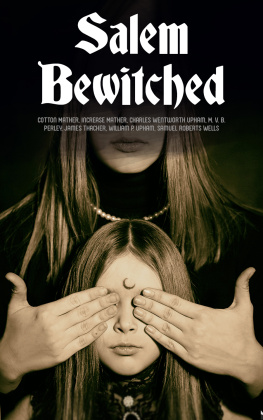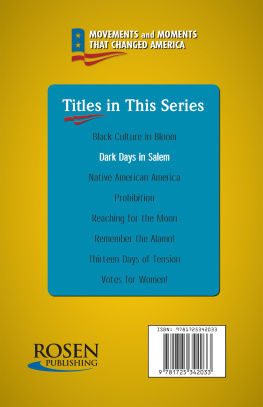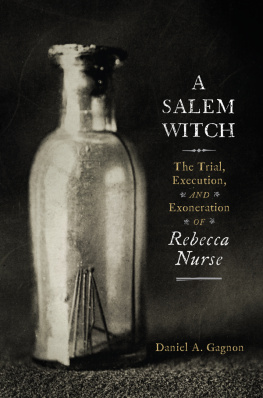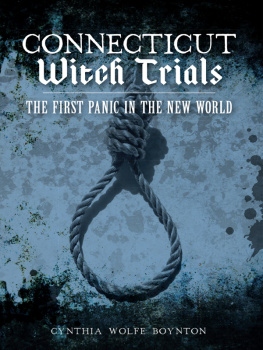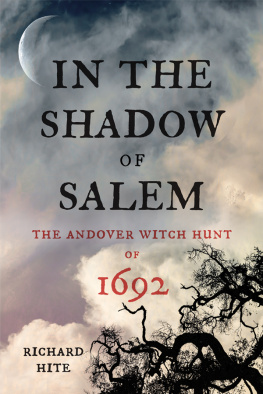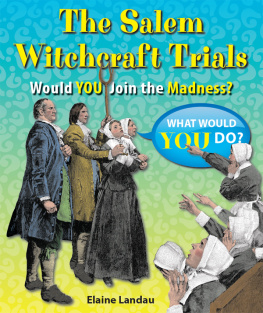The Wonders of the Invisible World
by Cotton Mather and Increase Mather
Introduction
The two very rare works reprinted in the present volume, written by two of the most celebrated of the early American divines, relate to one of the most extraordinary cases of popular delusion that modern times have witnessed. It was a delusion, moreover, to which men of learning and piety lent themselves, and thus became the means of increasing it. The scene of this affair was the puritanical colony of New England, since better known as Massachusetts, the colonists of which appear to have carried with them, in an exaggerated form, the superstitious feelings with regard to witchcraft which then prevailed in the mother country. In the spring of 1692 an alarm of witchcraft was raised in the family of the minister of Salem, and some black servants were charged with the supposed crime. Once started, the alarm spread rapidly, and in a very short time a great number of people fell under suspicion, and many were thrown into prison on very frivolous grounds, supported, as such charges usually were, by very unworthy witnesses. The new governor of the colony, Sir William Phipps, arrived from England in the middle of May, and he seems to have been carried away by the excitement, and authorized judicial prosecutions. The trials began at the commencement of June; and the first victim, a woman named Bridget Bishop, was hanged. Governor Phipps, embarrassed by this extraordinary state of things, called in the assistance of the clergy of Boston.
There was at this time in Boston a distinguished family of puritanical ministers of the name of Mather. Richard Mather, an English non-conformist divine, had emigrated to America in 1636, and settled at Dorchester, where, in 1639, he had a son born, who was named, in accordance with the peculiar nomenclature of the puritans, Increase Mather. This son distinguished himself much by his acquirements as a scholar and a theologian, became established as a minister in Boston, and in 1685 was elected president of Harvard College. His son, born at Boston in 1663, and called from the name of his mother's family, Cotton Mather, became more remarkable than his father for his scholarship, gained also a distinguished position in Harvard College, and was also, at the time of which we are speaking, a minister of the gospel in Boston. Cotton Mather had adopted all the most extreme notions of the puritanical party with regard to witchcraft, and he had recently had an opportunity of displaying them. In the summer of the year 1688, the children of a mason of Boston named John Goodwin were suddenly seized with fits and strange afflictions, which were at once ascribed to witchcraft, and an Irish washerwoman named Glover, employed by the family, was suspected of being the witch. Cotton Mather was called in to witness the sufferings of Goodwin's children; and he took home with him one of them, a little girl, who had first displayed these symptoms, in order to examine her with more care. The result was, that the Irish woman was brought to a trial, found guilty, and hanged; and Cotton Mather published next year an account of the case, under the title of "Late Memorable Providences, relating to Witchcraft and Possession," which displays a very extraordinary amount of credulity, and an equally great want of anything like sound judgment. This work, no doubt, spread the alarm of witchcraft through the whole colony, and had some influence on the events which followed. It may be supposed that the panic which had now arisen in Salem was not likely to be appeased by the interference of Cotton Mather and his father.
The execution of the washerwoman, Bridget Bishop, had greatly increased the excitement; and people in a more respectable position began to be accused. On the 19th of July five more persons were executed, and five more experienced the same fate on the 19th of August. Among the latter was Mr. George Borroughs, a minister of the gospel, whose principal crime appears to have been a disbelief in witchcraft itself. His fate excited considerable sympathy, which, however, was checked by Cotton Mather, who was present at the place of execution on horseback, and addressed the crowd, assuring them that Borroughs was an impostor. Many people, however, had now become alarmed at the proceedings of the prosecutors, and among those executed with Borroughs was a man named John Willard, who had been employed to arrest the persons charged by the accusers, and who had been accused himself, because, from conscientious motives, he refused to arrest any more. He attempted to save himself by flight; but he was pursued and overtaken. Eight more of the unfortunate victims of this delusion were hanged on the 22nd of September, making in all nineteen who had thus suffered, besides one who, in accordance with the old criminal law practice, had been pressed to death for refusing to plead. The excitement had indeed risen to such a pitch that two dogs accused of witchcraft were put to death.
A certain degree of reaction, however, appeared to be taking place, and the magistrates who had conducted the proceedings began to be alarmed, and to have some doubts of the wisdom of their proceedings. Cotton Mather was called upon by the governor to employ his pen in justifying what had been done; and the result was, the book which stands first in the present volume, "The Wonders of the Invisible World;" in which the author gives an account of seven of the trials at Salem, compares the doings of the witches in New England with those in other parts of the world, and adds an elaborate dissertation on witchcraft in general. This book was published at Boston, Massachusetts, in the month of October, 1692. Other circumstances, however, contributed to throw discredit on the proceedings of the court, though the witch mania was at the same time spreading throughout the whole colony. In this same month of October, the wife of Mr. Hale, minister of Beverley, was accused, although no person of sense and respectability had the slightest doubt of her innocence; and her husband had been a zealous promoter of the prosecutions. This accusation brought a new light on the mind of Mr. Hale, who became convinced of the injustice in which he had been made an accomplice; but the other ministers who took the lead in the proceedings were less willing to believe in their own error; and equally convinced of the innocence of Mrs. Hale, they raised a question of conscience, whether the devil could not assume the shape of an innocent and pious person, as well as of a wicked person, for the purpose of afflicting his victims. The assistance of Increase Mather, the president or principal of Harvard College, was now called in, and he published the book which is also reprinted in the present volume: "A Further Account of the Tryals of the New England Witches.... To which is added Cases of Conscience concerning Witchcrafts and Evil Spirits personating Men." It will be seen that the greater part of the "Cases of Conscience" is given to the discussion of the question just alluded to, which Increase Mather unhesitatingly decides in the affirmative. The scene of agitation was now removed from Salem to Andover, where a great number of persons were accused of witchcraft and thrown into prison, until a justice of the peace named Bradstreet, to whom the accusers applied for warrants, refused to grant any more. Hereupon they cried out upon Bradstreet, and declared that he had killed nine persons by means of witchcraft; and he was so much alarmed that he fled from the place. The accusers aimed at people in higher positions in society, until at last they had the audacity to cry out upon the lady of governor Phipps himself, and thus lost whatever countenance he had given to their proceedings out of respect to the two Mathers. Other people of character, when they were attacked by the accusers, took energetic measures in self-defence. A gentleman of Boston, when "cried out upon," obtained a writ of arrest against his accusers on a charge of defamation, and laid the damages at a thousand pounds. The accusers themselves now took fright, and many who had made confessions retracted them, while the accusations themselves fell into discredit. When governor Phipps was recalled in April, 1693, and left for England, the witchcraft agitation had nearly subsided, and people in general had become convinced of their error and lamented it.

